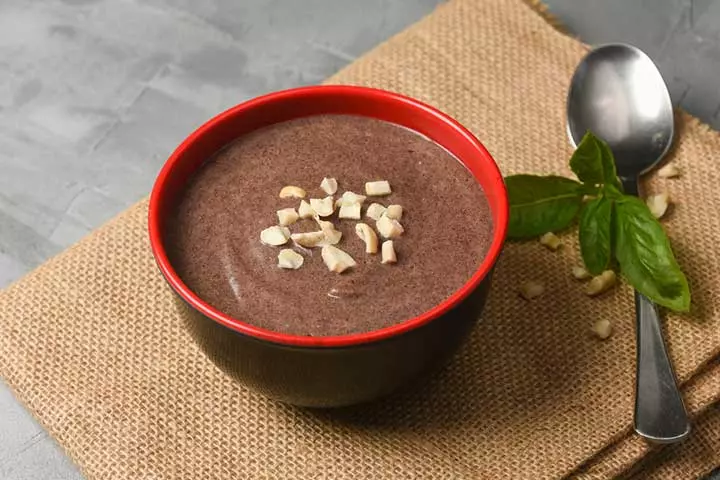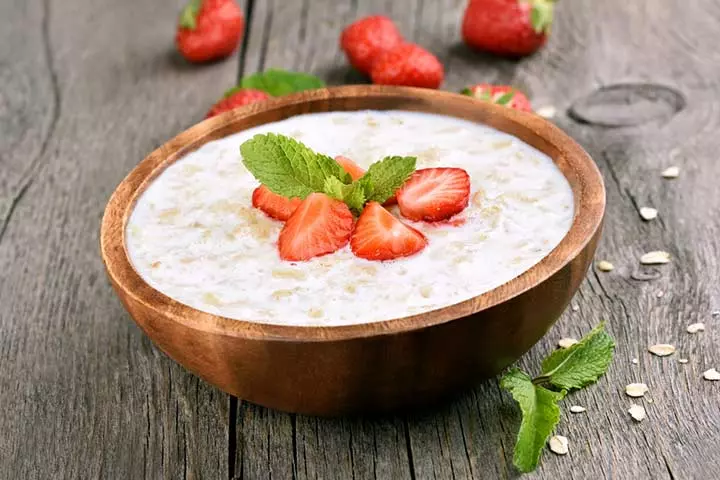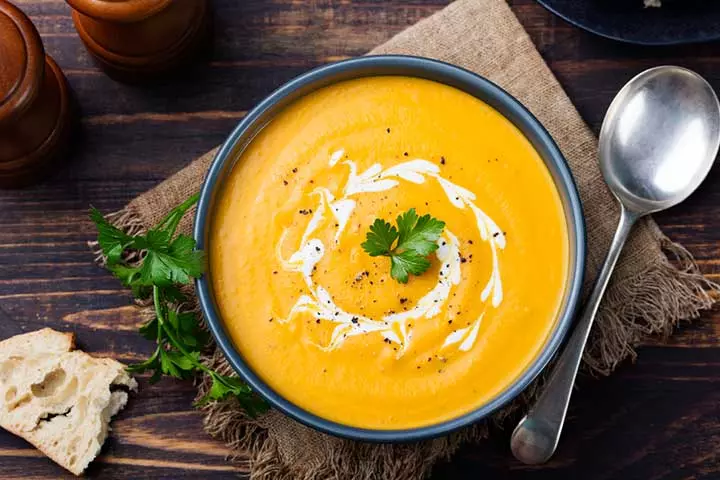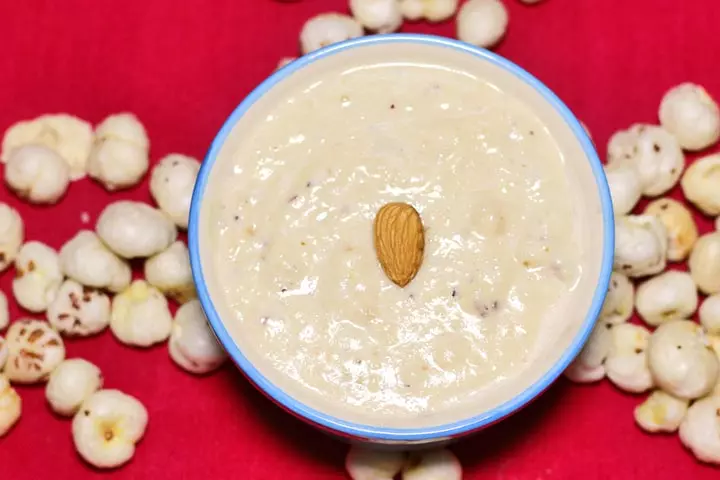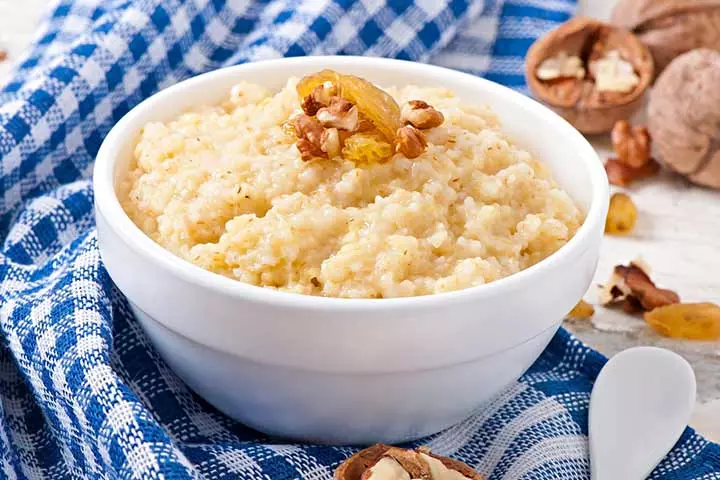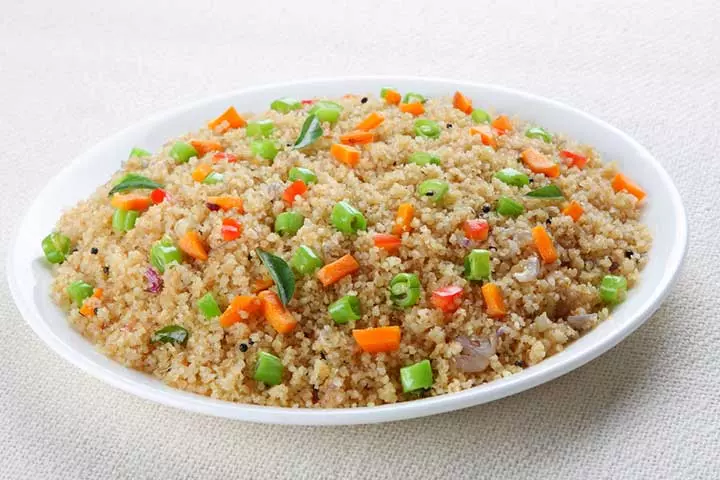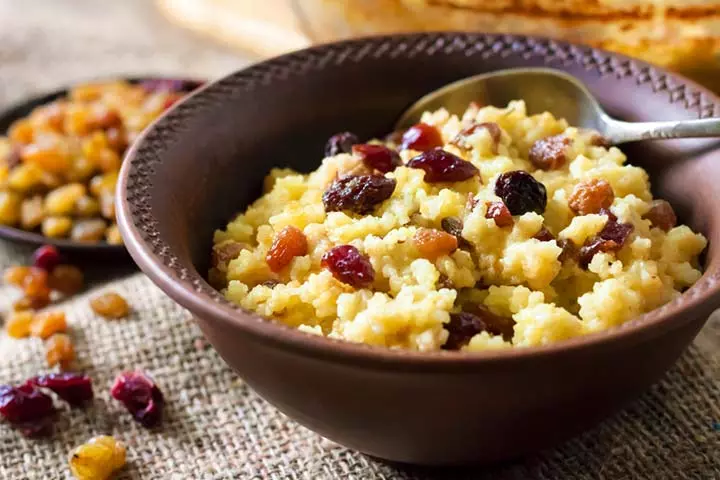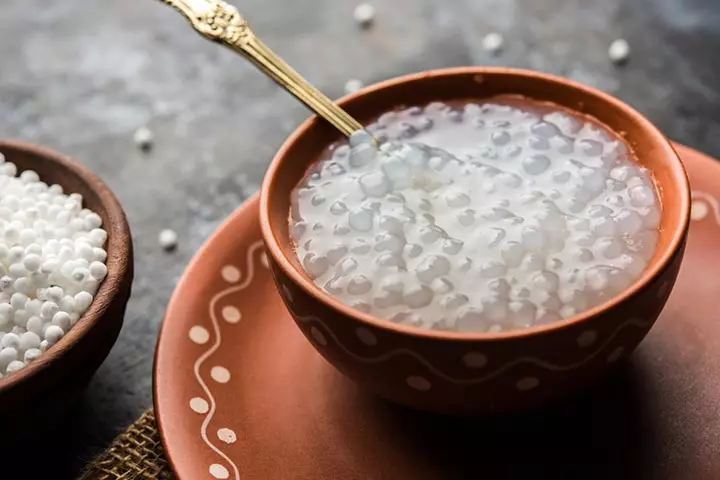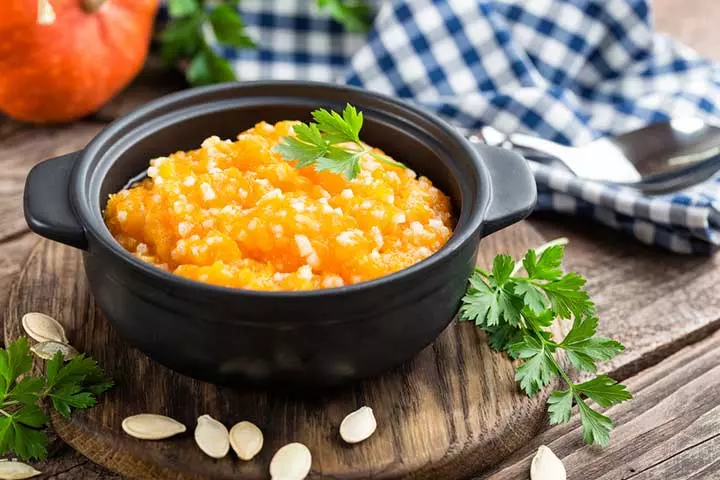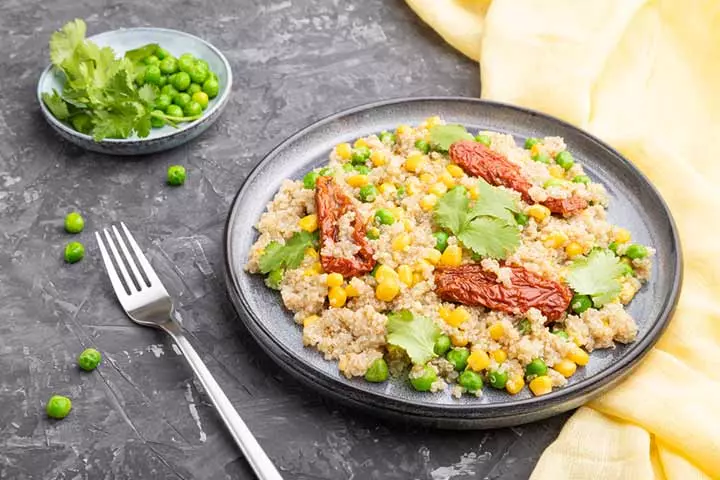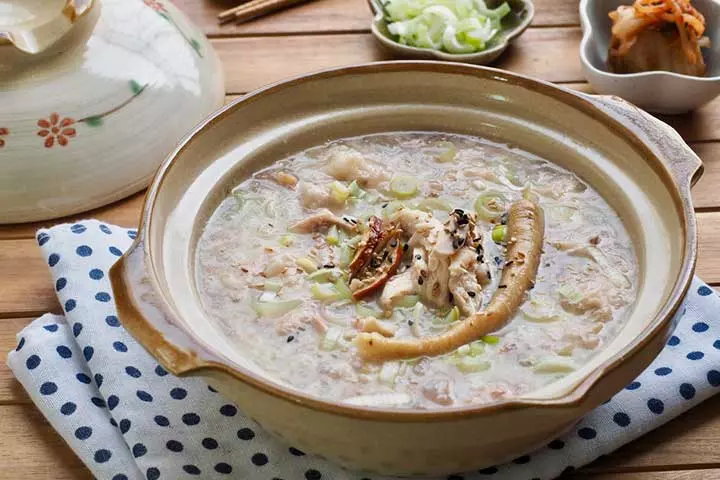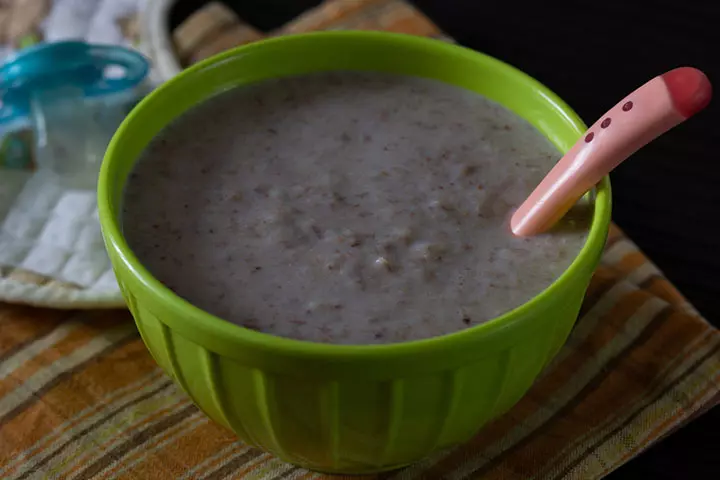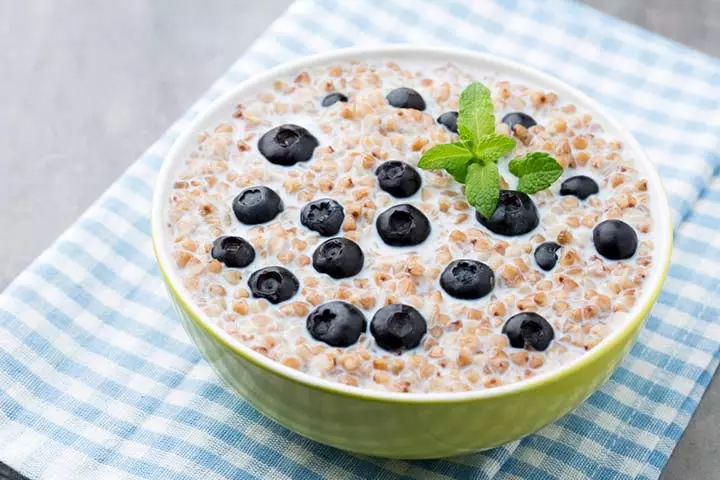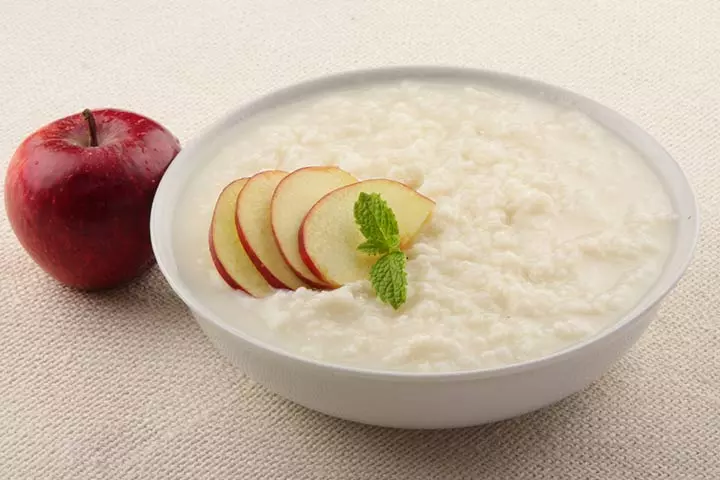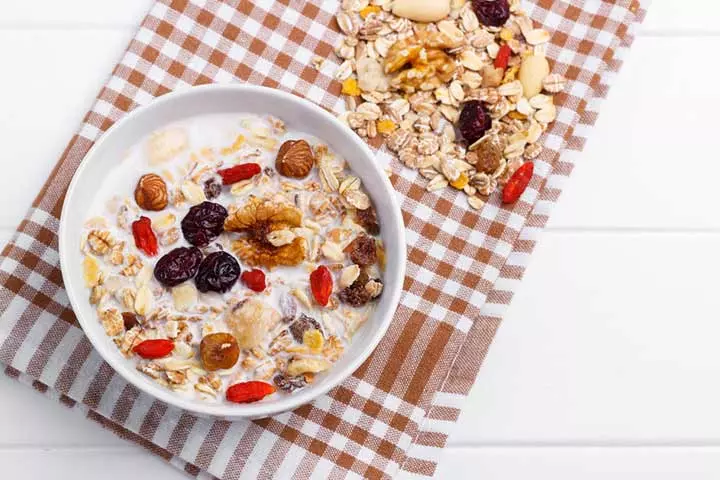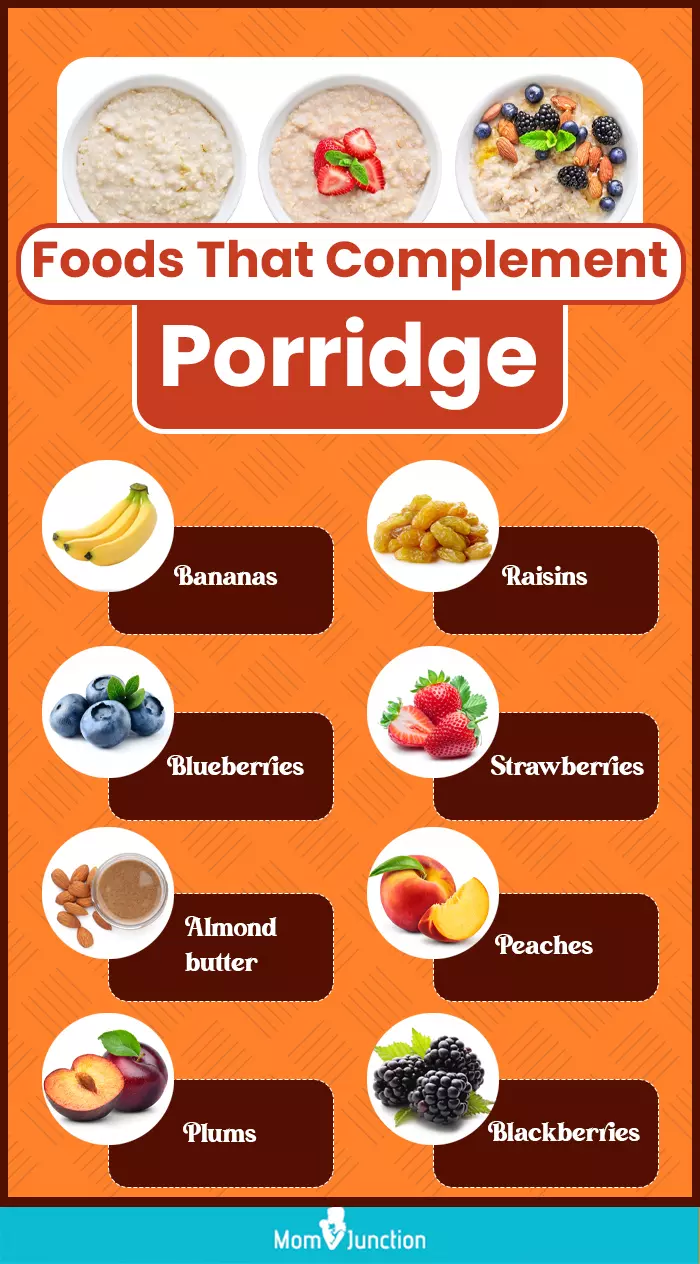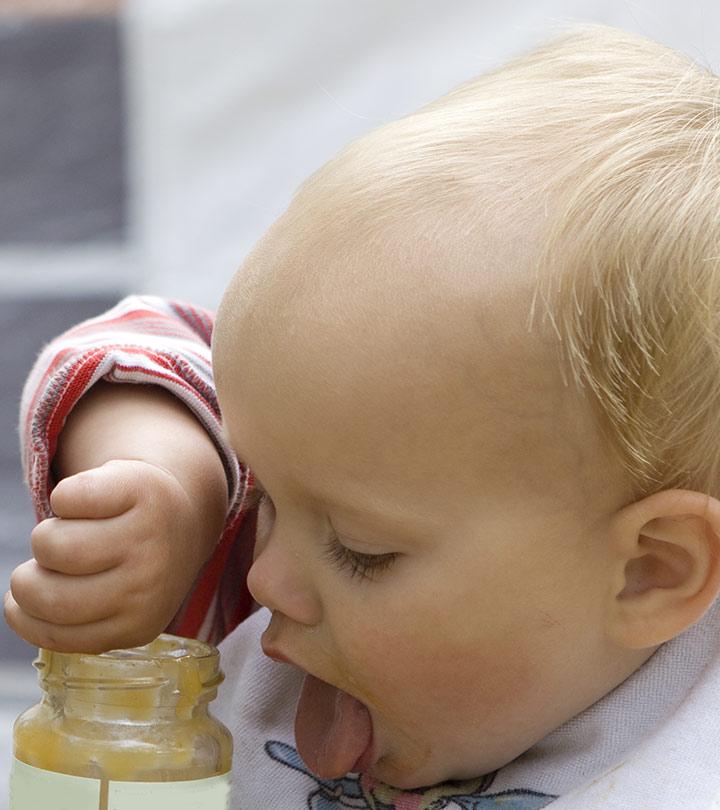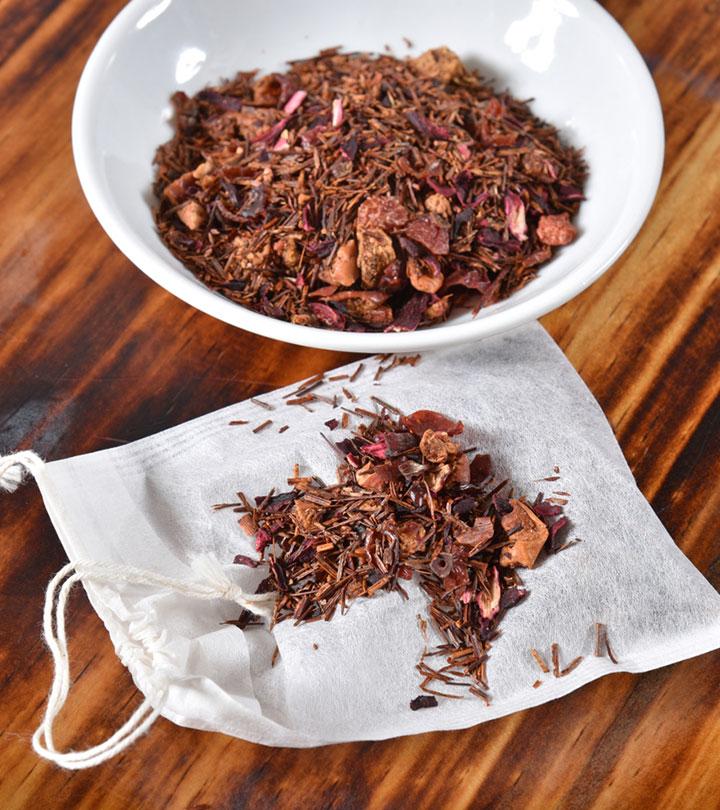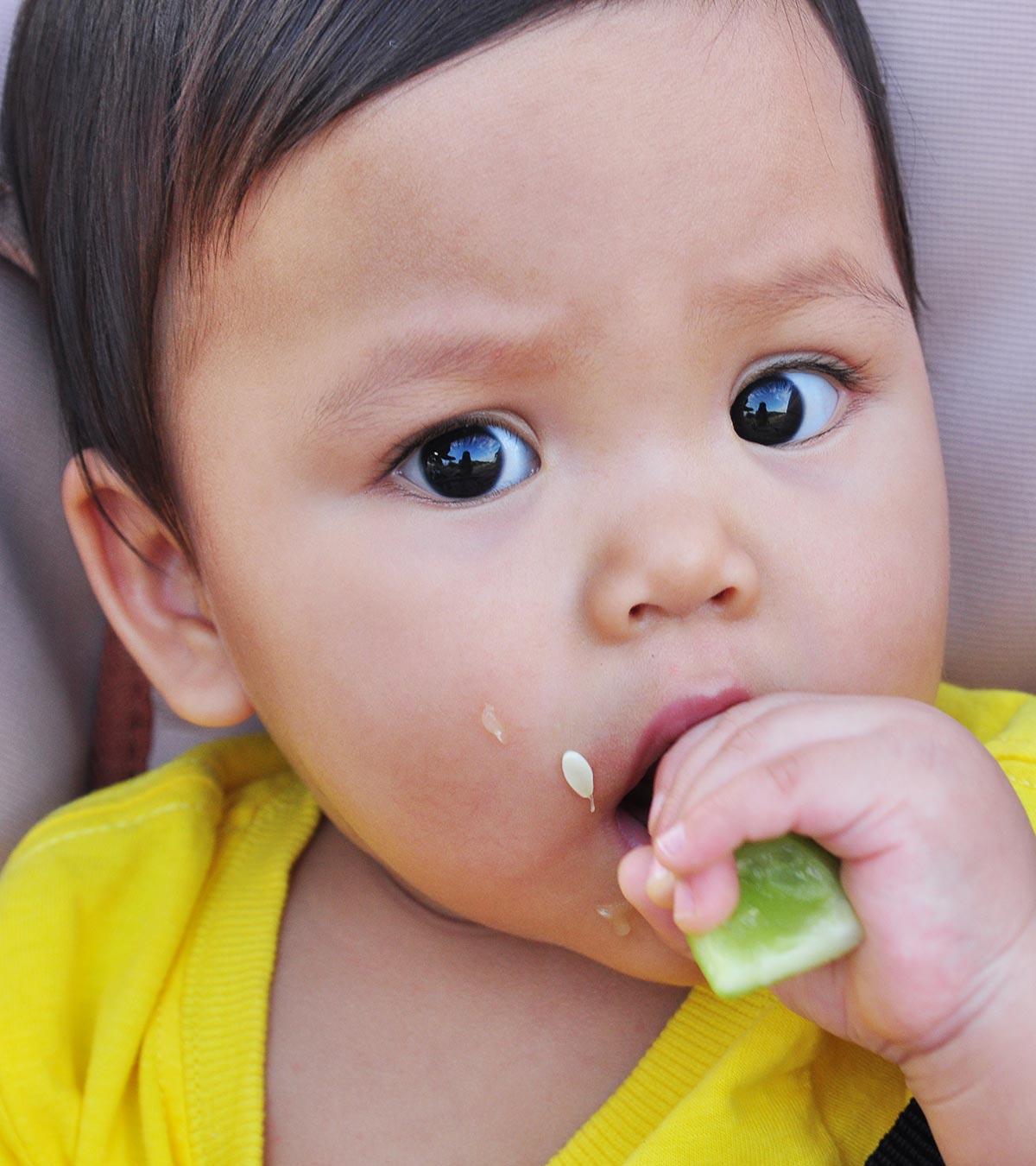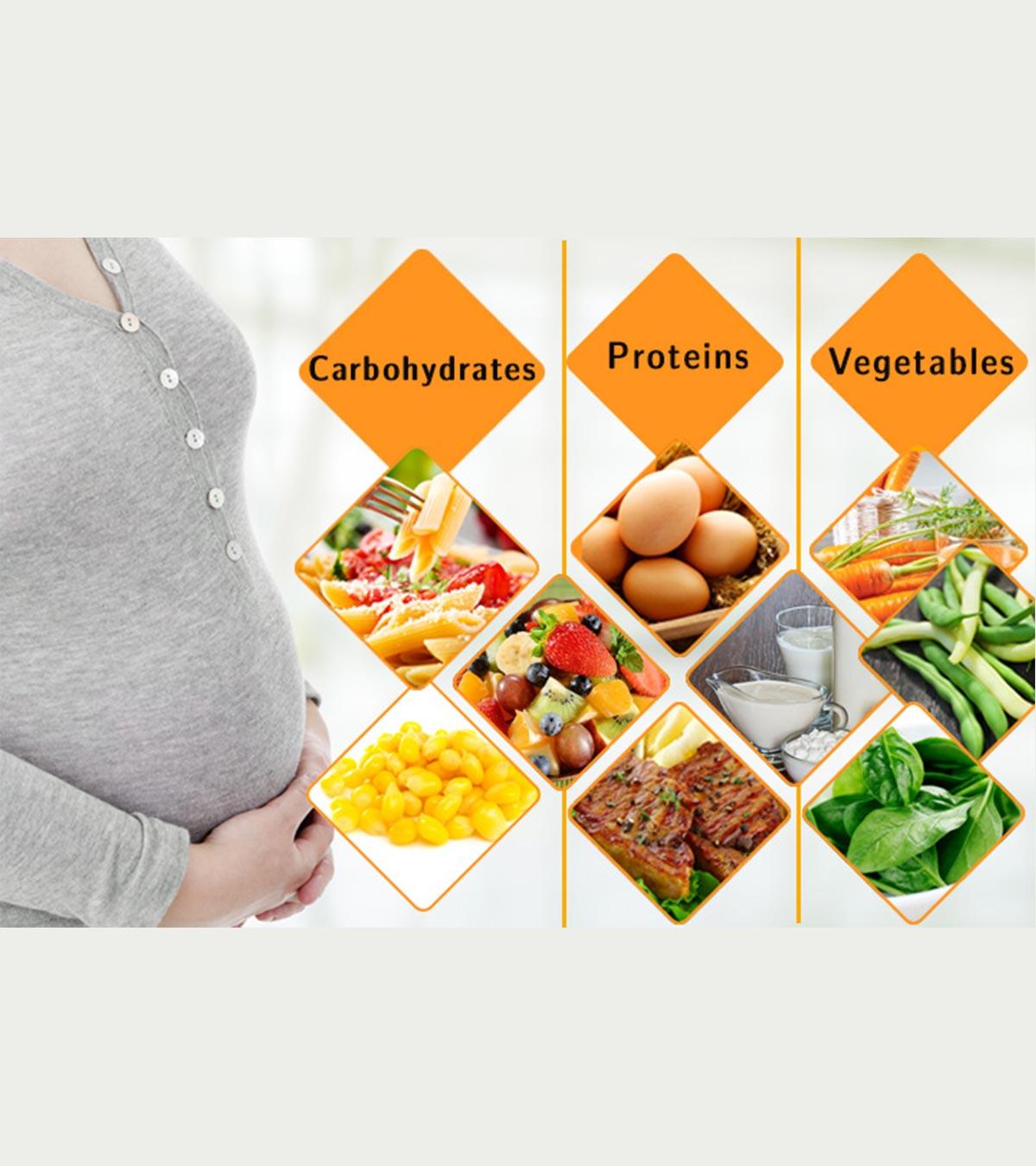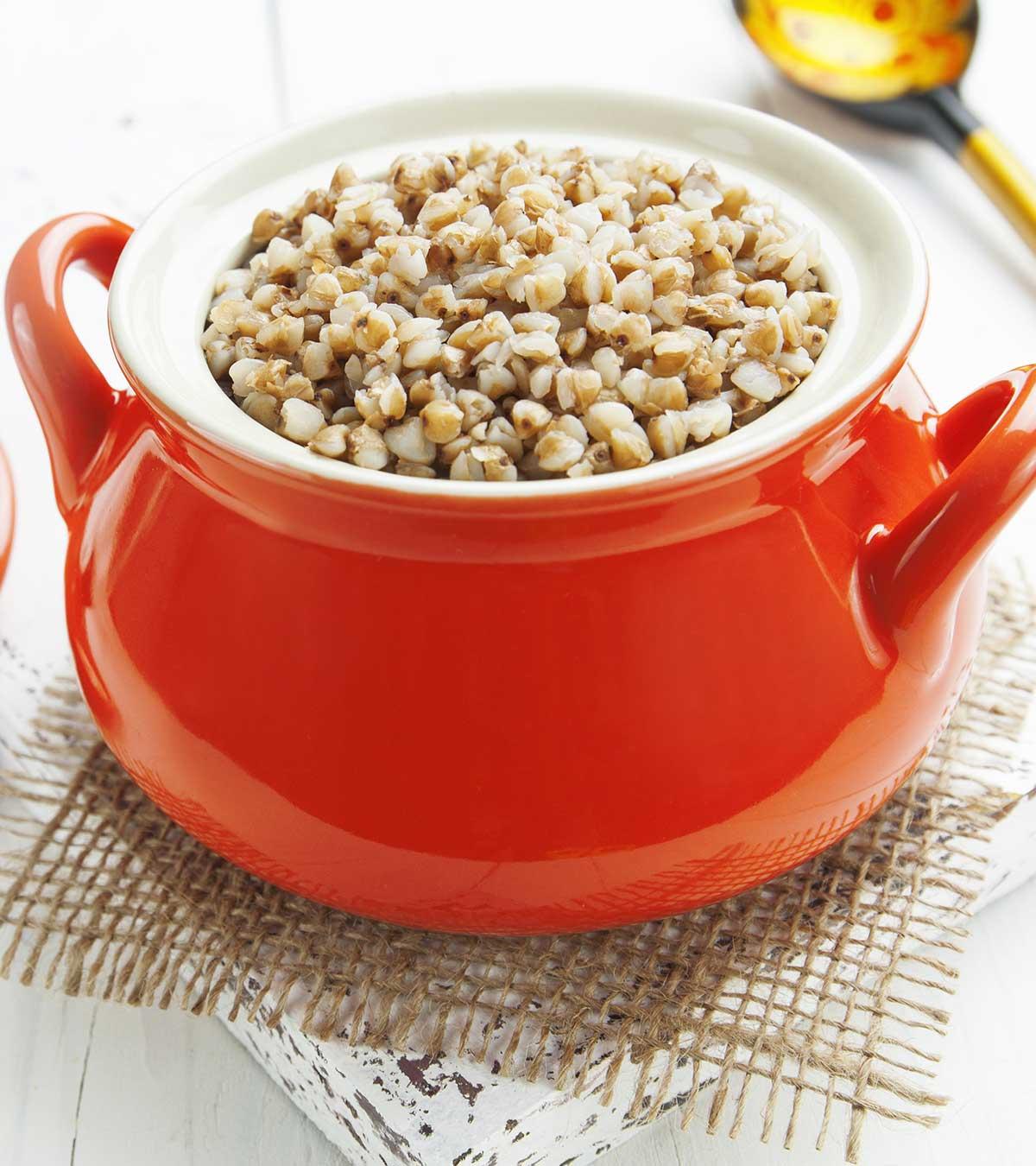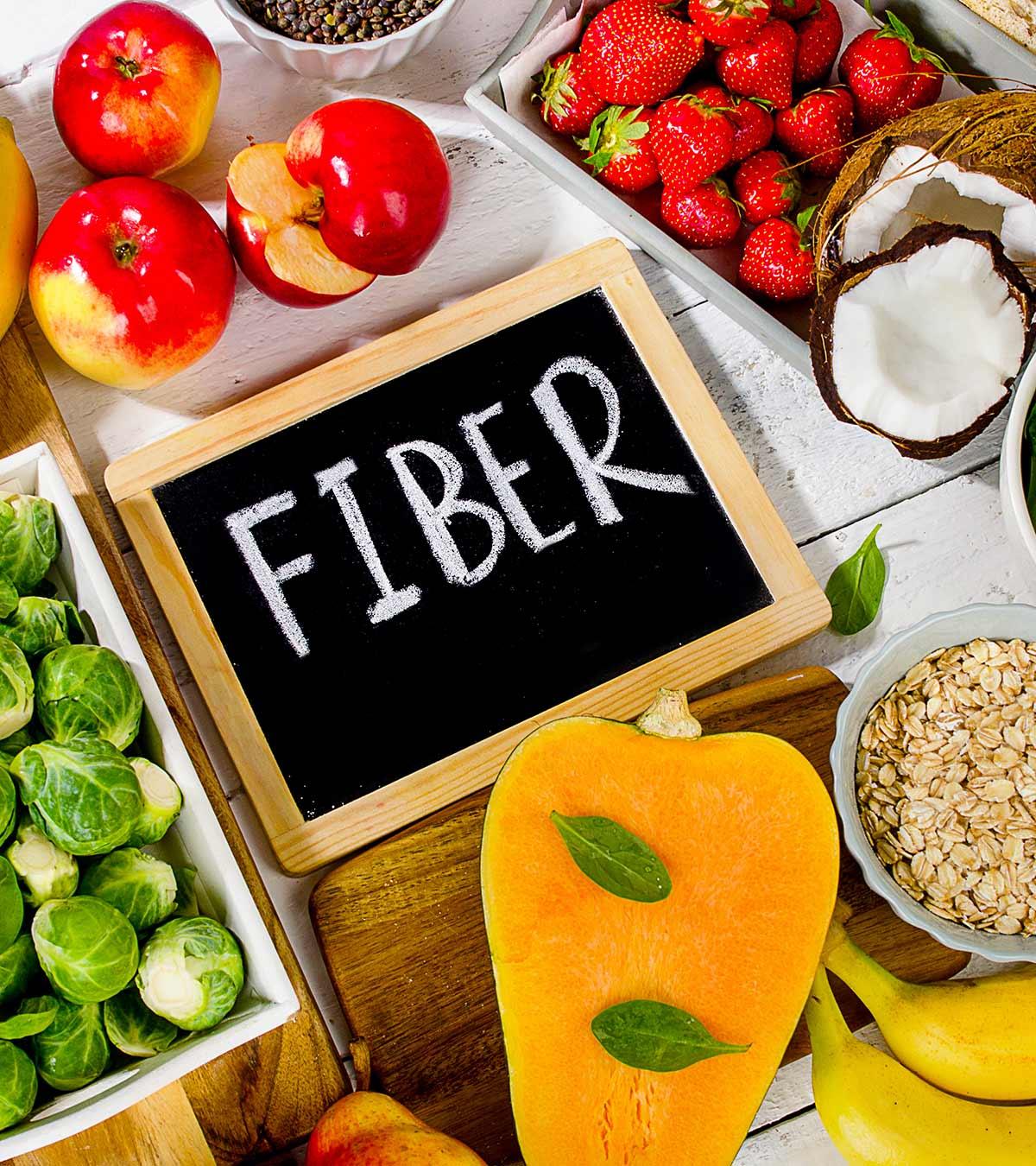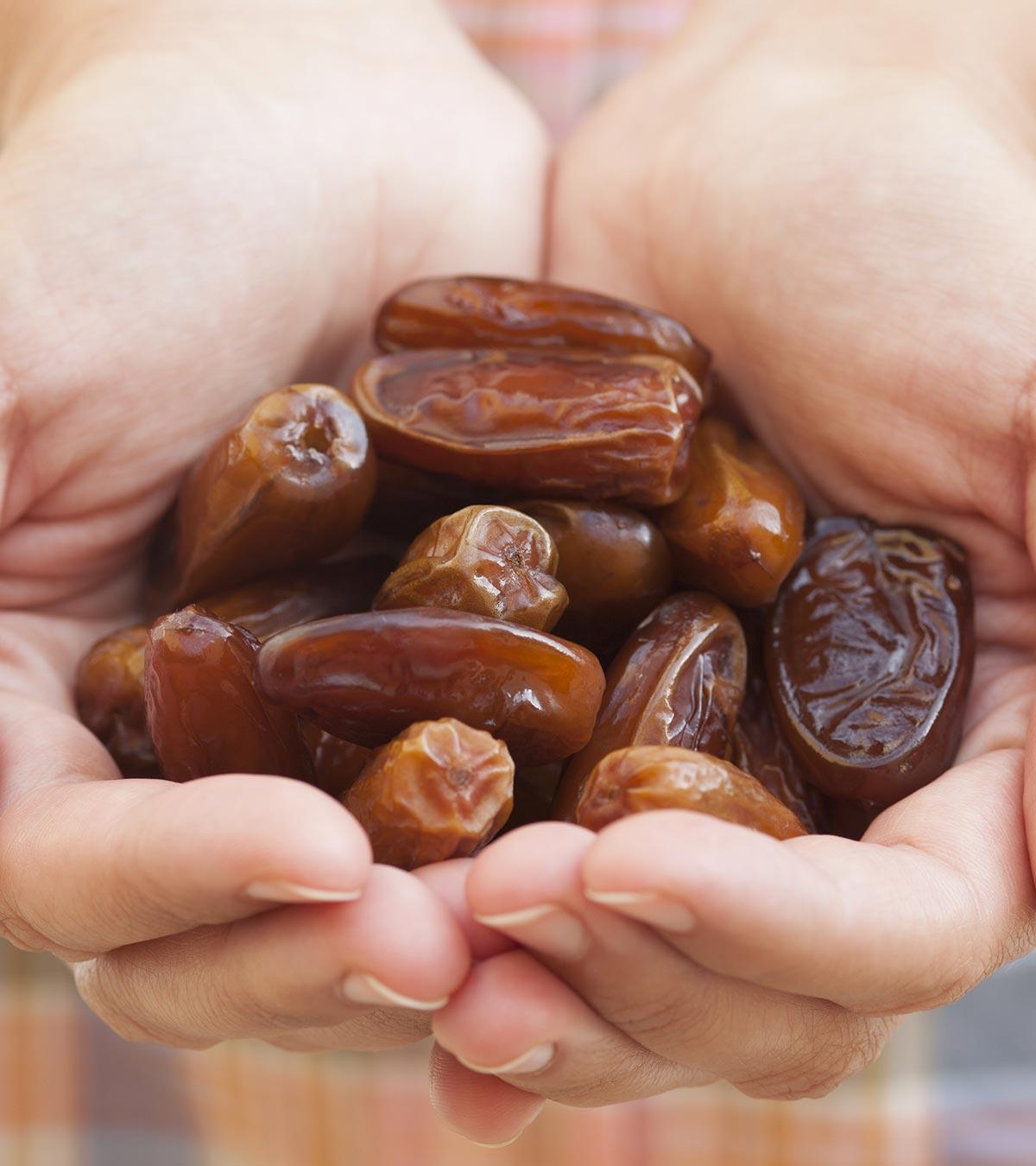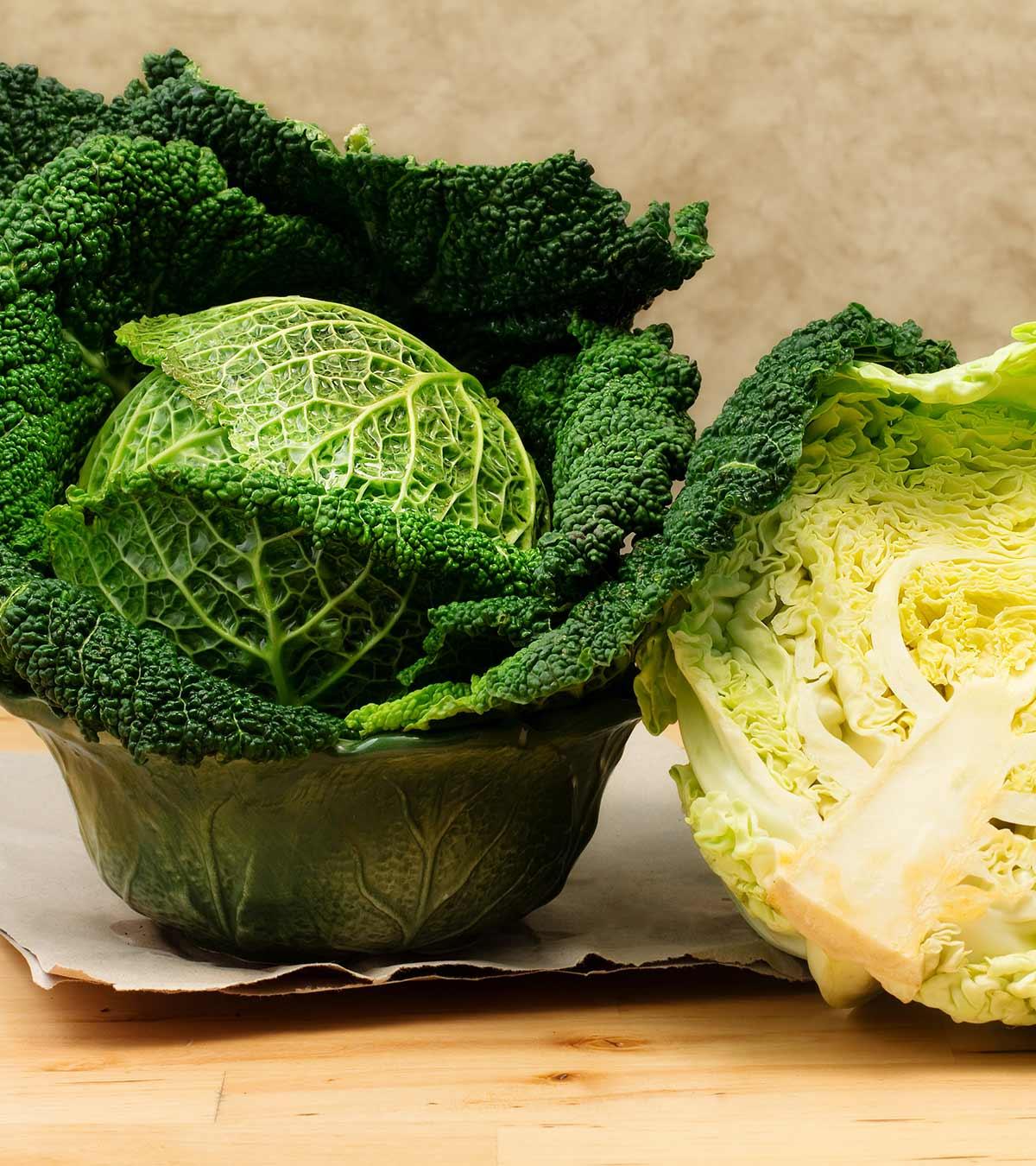
Nutritious porridge recipes for babies can be customized with the ingredients that suit your little one’s palate and age. Porridge is a thick, soupy dish that mainly comprises grains cooked in water or milk. As your baby turns six months, they can begin to consume porridge as a weaning food (1).
You could try making healthy porridges by adding nutritional components, such as dry fruits, vegetables, and nuts, and serve it for breakfast, lunch, or dinner. Including a variety of porridges in your baby’s well-planned balanced meal helps provide the required nourishment to the baby.
Browse through this post to explore several easy and nourishing porridge recipes that babies and toddlers may enjoy.
23 Easy Porridge Recipes For Babies And Toddlers
Below are some age-appropriate and nutritious homemade porridge recipes you can feed your baby and toddler. These homemade baby food recipes can help meet the baby’s nutrition needs.
Porridge recipes for six months+ babies
1. Rice porridge
You will need:
- ½ cup white rice (washed, drained, and dried)
- ¼ tsp jaggery powder (optional)
- 1 cup water
How to:
- In a saucepan, dry roast the rice over low heat until the rice turns light brown. Set aside to cool.
- Grind the rice into a lump-free, fine powder using a grinder and store it in an airtight container. If your blender cannot process well, then sieve the flour and powder the coarse grains again.
- Put water in a pan and bring it to a boil over medium heat.
- Add two tablespoons of the rice powder to the boiling water and cook until you get a semi-thick paste.
- Add jaggery powder and cook the porridge for another two to three minutes. Turn off the flame, pour the porridge into a bowl, and feed this delicious rice porridge to your weaning baby or toddler.
- You can add breast milk or formula milk to thicken porridge’s consistency. It makes it delicious, creamy, and smooth. Brown rice can be used instead of white rice once the baby seems comfortable consuming rice.
Ashlyn, a mother of three, recounts her baby’s porridge journey, “Emma (her daughter) started brown rice cereal for lunch when she was six months old and tried a few vegetable purées in between. When she was seven months old, she progressed to having porridge for lunch. At eight months, she finally joined us at the table for dinner (ⅰ).’’
2. Ragi porridge
You will need:
- 1tbsp homemade ragi powder
- ¼ tsp jaggery powder (optional)
- ½ cup water
How to:
- Add ragi powder and two tablespoons of water into a small mixing bowl. Mix well to prepare a lump-free and smooth paste and set aside.
- Boil water in a saucepan over low heat. Add ragi paste with constant stirring and cook over low heat until the mixture thickens.
- Turn off the flame and stir in jaggery powder, ensuring no lumps form. You can add formula milk as needed.
- Transfer the porridge to a feeding bowl and feed warm.
- You can add finely powdered nuts, dry fruits, or fruit puree to this recipe for babies older than seven months.
3. Barley porridge
You will need:
- 1tbsp barley powder
- 1tbsp apple puree
- ¼ tsp raisin puree
- 1 cup water
How to:
- Boil water in a medium-sized saucepan over low heat.
- Just as the water begins boiling, add barley powder while stirring constantly.
- Add apple puree and raisin puree. Mix well and cook over low to medium heat, until the porridge thickens to the desired consistency.
- Turn off the heat and transfer the porridge into a feeding bowl. Serve warm.
- You can add carrot puree or pumpkin puree to make a different recipe version of this healthy baby food.
4. Semolina porridge
You will need:
- 2tbsps semolina (dry roasted)
- 1tbsp mashed banana
- 1 cup water
How to:
- Boil water in a saucepan over low heat.
- Add roasted semolina with constant stirring. Ensure the mixture is lump-free.
- Now, add banana mash and cook the mixture for seven to eight minutes over low heat to get the desired consistency.
- Turn off the heat and transfer the porridge into a feeding bowl. Serve warm.
- Add breast milk or formula milk to this recipe if the porridge is too thick. The same recipe can be served to toddlers with whole milk and a tablespoon of finely powdered nuts.
5. Oats porridge
You will need:
- 2tbsps rolled oats
- 2tbsps papaya puree
- 40ml breast milk or formula milk
- 1 cup water
How to:
- Boil water in a cooking pot over low heat.
- Add rolled oats with a vigorous stir to avoid forming lumps. Let the oats cook for five to seven minutes or until it thickens to the desired consistency. You can dry roast the oats for easy digestibility.
- Turn off the heat and mix papaya puree into the porridge thoroughly. Set aside to cool.
- Transfer the porridge into a feeding bowl, add breast milk or formula milk, and serve immediately.
- You can add whole milk and finely chopped strawberry to this recipe for toddlers older than 12 months.
6. Rice and yellow lentil porridge
You will need:
- 2tbsp parboiled rice
- 1tbsp yellow lentil (washed and drained)
- 1tsp cumin seeds
- ½ tsp clarified butter (ghee)
- 1½ cup water
How to:
- Dry roast rice and yellow lentil in a saucepan over low heat, until the lentil turns golden brown and the rice looks puffed. Transfer the roasted ingredients into a bowl.
- Dry roast cumin seeds in the same saucepan over medium heat until they begin giving off a pleasing aroma.
- Turn off the flame and add the roasted cumin seeds to the rice and lentil mix.
- Grind the roasted ingredients into a fine powder using a grinder. Make sure there are no coarse grains left but You can keep this powder slightly coarse for toddlers.
- Heat ghee in a clean saucepan over low flame.
- Once the ghee warms, add two teaspoons of the freshly ground powder mix and water to it. Mix well with a spoon, stirring continuously to ensure no lumps form.
- Cook the porridge for ten minutes or until the porridge thickens and the rice looks mashable. Add more water to adjust consistency if required.
- Turn off the flame and pour some porridge into the feeding bowl. Serve warm.
- You can add the vegetable puree to this recipe for babies older than seven months and finely chopped vegetables and coriander for babies older than ten months.
7. Lotus seed (makhana) porridge
You will need:
- 2tbsp lotus seeds (makhana)
- ½tsp jaggery powder
- ¼tsp cumin seeds
- ½ cup water
How to:
- Dry roast lotus seeds to light brown in a skillet over low heat. Set aside to cool.
- In the same skillet, dry roast cumin seeds and add them to lotus seeds.
- Grind lotus seeds and cumin seeds into a fine powder using a food processor or grinder. Use a sieve to remove the coarse part and you can powder it again.
- Boil water in a saucepan over low heat and mix jaggery powder until it dissolves completely.
- Add the lotus and cumin seed powder into the water, still on low heat until the makhanas turn mushy and gooey and stirring vigorously. Ensure no lumps form.
- Cook for five minutes, occasionally stirring until the porridge thickens to a soup-like consistency.
- Turn off the heat and transfer the porridge to a feeding bowl. Feed warm.
- Add dry fruit and nuts powder to this recipe for babies older than eight months. You can also add homemade Cerelac powder to this recipe to intensify the recipe’s nutritional value. You can try adding fruit puree or dates puree as per choice.
Porridge recipes for 8 months+ babies
8. Wheat porridge
You will need:
- 2tbsps wheat flour
- 1tbsp yellow lentil (washed and drained)
- 1tsp almond flour
- ½tsp jaggery powder
- 1 cup water
How to:
- Put yellow lentil into a saucepan and dry roast over low heat until its color changes to a golden brown. Turn off the heat and set the pan aside to cool.
- Blend the lentil into a fine powder using a high-speed grinder. Sieve the powder into a bowl using a fine-mesh sieve. to remove the coarse part if any.
- Dry roast the wheat flour over a low flame until it turns light brown.
- Turn off the flame and add the lentil powder, almond flour, and wheat flour into a bowl. Mix the flour mix well and store in an airtight container.
- Boil water in a cooking pot over low heat and stir in jaggery powder. Mix well until the powder dissolves completely.
- Slowly, add two tablespoons of flour mix into the water while continuously stirring so that no lumps form.
- Cook the mix on low heat until the porridge thickens to a soup-like consistency. Stir occasionally to ensure the mixture does not stick at the bottom of the cooking pot.
- Once done, turn off the flame and pour the porridge into a bowl. Feed warm. You can add a sweet apple puree, a ripe banana puree, or even chikoo puree to this to add up the nutritional value and flavor.
 Experts say
Experts say9. One-pot broken wheat (daliya) porridge
You will need:
- 4tbsp broken wheat
- ½ cup carrot, corn, green peas, and potato (mashed)
- ½tsp cumin seeds
- 1tsp clarified butter (ghee)
- 1 cup water
How to:
- Heat ghee in a pressure cooker over low heat and add cumin seeds.
- As the seeds begin to crackle, add mashed veggies and mix well for about two minutes. You can add dry fruit powder also.
- Add water and cook the mix for two to three minutes while stirring constantly.
- Stir in broken wheat to the mix and pressure cook the mixture for four to five whistles over medium heat. Turn off the flame and set the cooker aside to cool.
- Transfer some porridge into the feeding bowl and serve warm.
10. Savory oats porridge
You will need:
- 4tbsp organic rolled oats
- ½ cup corn, carrot, green peas, and capsicum (grated)
- 1tsp cumin seed½tsp fresh lemon juice
- ½tsp sesame seeds (roasted)
- 1tsp olive oil
- 1 cup water
How to:
- Heat olive oil in a medium-sized saucepan over low heat.
- Add cumin seeds and saute veggies for five minutes.
- Add water and rolled oats. Mix everything well and cook for seven to eight minutes. You can dry roast the oats for better digestibility.
- Turn off the heat and transfer the oats into a feeding bowl.
- Stir in lemon juice, sprinkle sesame seeds, and serve warm. Season with roasted cumin powder and black pepper powder.
11. Pearl millet (bajra) porridge
You will need:
- 4tbsp bajra (coarsely ground)
- 2tbsp apple and banana puree
- 1tbsp dates puree
- 1tsp clarified butter (ghee)
- 1 cup water
How to:
- Heat ghee in the pressure cooker over low heat.
- As the ghee warms, add dates puree and coarsely grounded bajra. Mix well.
- Add water and pressure cook for four to five whistles over medium heat. Once done, set aside the cooker to cool.
- Transfer the cooked porridge in a bowl, stir in apple and banana puree, and serve right away.
- You can add chopped fresh berries or raisins to this recipe for toddlers older than 12 months.
12. Sago porridge
You will need:
- ¼ cup sago
- 1 cup water (for cooking)
- 2tbsp raisins puree
- 1tbsp nuts powder
- 1tsp clarified butter (ghee)
How to:
- Soak sago in water for at least an hour. Soaking time depends on the sago variety. Wash them well under running water, drain, and set aside.
- Boil water in a saucepan over low heat and add sago. Cook until the sago turns transparent. Once sago is cooked it becomes light; at this stage add other ingredients.
- Add raisin puree, nuts powder, and ghee. Simmer the mixture for five minutes or until the porridge thickens.
- Turn off the heat and pour some porridge into a bowl for feeding.
- You can add finely chopped seasonal fruits and whole milk to this recipe to prepare delicious breakfast porridge for toddlers.
13. Brown rice and pumpkin porridge
You will need:
- 2tbsp brown rice
- 1 cup pumpkin mash (deskinned, deseeded, and cooked)
- ½tsp cinnamon powder
- 1tsp walnut (finely ground)
- 1 cup water
How to:
- Wash the brown rice thoroughly and soak it in water for at least 30 minutes. Drain the water after 30 minutes and set aside.
- Blend rice, pumpkin mash, cinnamon powder, walnut, and water into a smooth, lump-free paste using a grinder/blender.
- Pour the blended paste and water into a saucepan and bring it to boil on high heat until you get the desired consistency.
- Reduce the heat to low and simmer the mixture for five minutes, stirring constantly.
- Turn off the heat and sieve the porridge and transfer the porridge into a bowl. Feed warm.
- You can add whole milk to this recipe for toddlers older than 12 months.
Porridge recipes for 10 months+ babies
14. Quinoa porridge
You will need:
- ½ cup quinoa
- ½ cup carrot, green peas, potato, and corn (finely chopped)
- ¼ cup onion (chopped)
- ¼ cup tomatoes (chopped)
- 1tbsp cheddar cheese (grated)
- 1tsp cumin seeds
- 1tsp parsley (finely chopped)
- ½tsp sesame seeds (toasted)
- 1tbsp olive oil
- 2 cups water
How to:
- Heat olive oil in a saucepan over low heat and add cumin seeds.
- As the cumin seeds begin crackling, add onion and saute until they turn translucent.
- Add tomatoes and veggies and cook the mixture for about five to seven minutes.
- Add well-rinsed quinoa and water to the veggie mix and cook for about 15 minutes with occasional stirring to avoid forming lumps. Turn off the heat.
- Transfer the porridge into a bowl, sprinkle sesame seeds, and garnish with chopped parsley and cheese.
- The porridge is ready to feed. You can prepare sweet quinoa porridge with whole milk or coconut milk for toddlers older than 12 months. You can also add different lentils to the porridge.
 Point to consider
Point to consider15. Barnyard millet porridge
You will need:
- ¼ cup barnyard millet (washed and drained)
- ½ cup strawberry puree
- 1tsp raisin puree
- 1tsp almonds (finely chopped)
- 2 cups water
How to:
- Boil water in a cooking pot over low heat.
- Add barnyard millet and cook for 15 to 20 minutes or until the millet absorbs the water and turns into a soup-like consistency.
- Add strawberry puree, raisin puree, and chopped almonds. Mix everything well and cook for another five to seven minutes while stirring occasionally.
- Turn off the heat and transfer the porridge into a bowl. Feed warm or chill in the refrigerator for ten minutes before feeding. You can make it savory by replacing fruits with vegetables.
16. Chicken rice porridge
You will need:
- ½ cup white rice (washed and drained)
- ¼ cup chicken (shredded and cooked)
- ½ cup green onions (finely chopped)
- 1tsp ginger garlic paste
- 1tbsp sesame oil
- 2 cups water
How to:
- Boil water in a stockpot over medium heat.
- Add rice and chicken shreds and let the mix boil on low heat for 30 minutes.
- After 30 minutes, turn off the heat and set the stockpot aside.
- Heat sesame oil in a saucepan and saute ginger garlic paste until the raw aroma fades.
- Pour the rice and chicken mix into the saucepan and mix everything well. If the porridge gets thick at this point, stir in half a cup of water to dilute. Cook for five minutes and turn off the heat.
- Transfer some porridge into a bowl, garnish with green onions, and the porridge is ready to feed.
17. Quinoa and chicken congee
You will need:
- ½ cup chicken thigh fillets (skinless and boneless)
- 1cup low-sodium chicken stock
- 2 cups water
- ½ cup quinoa (cooked)
- 1 egg (beaten)
- 2tbsp shallots (finely chopped and fried)
- 1tbsp fresh coriander (finely chopped)
- 2 spring onion (finely sliced)
How to:
- Put a saucepan over low heat and add chicken, water, and chicken stock into it. Simmer on low heat for an hour.
- After an hour, remove the chicken from the saucepan and shred it finely using two forks.
- Put the shredded pieces back into the pan and stir in the beaten eggs. Cook for two to three minutes and turn off the heat.
- Transfer the chicken mixture into a bowl and add some quinoa. Keep an eye that quinoa does not stick to the bottom and its mixed well.
- Garnish with coriander, spring onion, and fried shallots. Serve warm. The congee will continue to thicken as it cools, then add some chicken stock if desired.
18. Sorghum porridge
You will need:
- 2tbsp sorghum flour
- 1tbsp jaggery powder
- ½tsp lemon juice
- 1½ cup water
How to:
- Put water in a saucepan and bring it to boil over low heat.
- Meanwhile, make a paste with two tablespoons of sorghum flour and cold water.
- Add the paste to the boiling water, constantly stirring until it thickens.
- Next, add lemon juice and simmer the mixture for about five minutes.
- Turn off the heat, transfer the porridge into a bowl, and it’s ready to feed.
Porridge recipes for 12 months+ babies
19. Buckwheat porridge
You will need:
- 2tbsp buckwheat powder
- 2 cups whole milk
- 2tbsp blueberry (finely chopped)
- 1tsp date puree
- 1tsp dry fruit powder
How to:
- Put a cup of milk in a saucepan and boil it over low heat.
- As the milk begins boiling, add buckwheat, dry fruit powder, and date puree while stirring constantly. Ensure no lumps form.
- Cook for ten minutes and add more milk if the porridge turns too thick.
- Turn off the flame and transfer the porridge into a bowl.
- Garnish with finely chopped blueberries and feed.
20. Rice and milk porridge
You will need:
- 4tbsp rice (cooked)
- 1tbsp apple (peeled and finely chopped)
- 1tbsp dried fruit powder
- 1 cup whole milk
How to:
- Boil milk in a cooking pot over low heat. Add rice and dry fruit powder and mix thoroughly so that no lumps form.
- Cook the mixture for about 15 minutes or until it thickens to soup-like consistency with a smooth texture.
- Turn off the heat and transfer the porridge into a bowl. Garnish with chopped apples or some other fruit of your baby’s liking and serve.
21. Fruity baby muesli
You will need:
- 1 cup whole milk
- 2tbsp rolled oats
- 1tbsp wheat flakes
- 1tbsp dry fruits (finely chopped)
- 1tbsp nuts (finely chopped)
- 1tsp organic honey
How to:
- Heat milk in a saucepan over low heat and add oats, wheat flakes, dry fruits, and nuts.
- Cover the saucepan and cook for ten minutes over low heat.
- Turn off the heat and transfer the porridge into a bowl.
- Stir in honey or jaggery and serve it to your toddler.
- You can add chopped fruits or fruits puree to this recipe. You can also add toasted sesame seeds or chopped pumpkin seeds to intensify the recipe’s nutritional value. and flavor.
22.Spinach, cottage cheese, and rice porridge
You will need:
- ¼ cup white rice
- ½ cup spinach (finely chopped)
- ½ cup corn, green peas, potato, capsicum, and broccoli (chopped)
- ¼ cup cottage cheese (crumbled)
- 1tsp cumin seeds
- 1tsp clarified butter (ghee)
- Salt, to taste
- 2 cups water
How to:
- Heat ghee in a pressure cooker and add cumin seeds.
- Add all the veggies and saute them for five minutes.
- Add water and rice and pressure cook for four to five whistles. Turn off the heat and set the cooker aside to let the pressure release.
- Open the lid and mash the rice and veggies roughly with a spoon or ladle.
- Mix crumbled cottage cheese mix well and add some water if the porridge seems thick. Transfer it to a feeding bowl and feed immediately.
- You can add tofu, soy nuggets, or chicken to substitute cottage cheese in this recipe.
23. Sweet Potato Poha Porridge
Image: Shutterstock
You will need:
- 1 sweet potato (cooked)
- 1/4 cup poha/beaten rice
- 1tbsp dry dates powder
- Cardamom (a pinch)
- Milk/water (as required)
- Ghee (as required)
How to:
- Wash flattened rice (poha) in a large bowl and let it soak for 10-15 minutes. After soaking, drain the water from the poha.
- Meanwhile, take boiled sweet potatoes, peel them, and transfer them to a vessel.
- Add the soaked poha to the sweet potato and mash them together.
- Add cardamom and dry dates powder to the mix. Then pour milk and ghee and mix well. Place the mixture on low/medium flame and continuously stir it.
- Turn off the flame upon reaching the desired consistency. Garnish with dry fruits (optional) and serve.
Points To Note While Making Porridge For Babies/Toddlers
Here are the key points to follow while preparing porridge for your baby/ toddler.
- Select age-appropriate ingredients, such as cereals, grains, millets, vegetables, fruits, nuts, seeds, and dairy products, before you plan to prepare porridge.
- Start with single-ingredient weaning recipes with a few ingredients. Gradually progress to recipes with multiple ingredients.
- Add as many fresh, seasonal vegetables and fruits as possible to intensify the porridge’s nutritional value. and serve warm.
 Quick tip
Quick tip- Include nutrient-dense foods, such as nuts, seeds, and dried fruits first in powder form and then as finely chopped small pieces or chunks for babies older than ten months.
- Add herbs and spices for flavor but do not use salt. Babies younger than a year do not need added salt as their kidneys cannot process it (2).
- Avoid using refined sugar and honey for babies under 12 months (3). Instead, use jaggery powder, fresh fruit, puree, date puree, pureed raisins, and dry fruit puree to add sweetness to a recipe.
- Do not use animal milk, such as cow milk, for babies under one year. Toddlers between 12 and 24 months can consume two to three cups of whole milk per day (4).
- Keep the porridge consistency semi-thick and lump-free for the baby to gulp it without much effort. Adjust the consistency by adding formula milk or warm water. Make sure not to boil or cook formula milk.
- Feed one to two tablespoons of porridge and gradually increase the quantity according to the baby or toddler’s age and digestibility.
- Stay alert for possible signs of intolerance, sensitivity, or allergy. Prepare porridge with foods that your baby is already consuming.
- Follow the three-day-wait rule in case you add any new ingredients to the porridge.
- Ensure to serve the porridge fresh and use the leftovers within a day.
- Add breast milk or formula milk to make the porridge palatable for young babies. However, do not heat the porridge after adding breast milk or formula milk.
- Make porridge a part of a well-balanced weaning diet and customize recipes to make them healthier.
Frequently Asked Questions
1. Which porridge is suitable for babies?
Rice porridge is an excellent baby food babies over six months can comfortably consume, as it is easily digestible and less likely to cause allergic reactions (5).
2. Can my baby eat porridge every day?
Yes. Babies can eat porridge daily as it is healthy and nutritious. You can try different sweet and savory porridge options to add variety to your baby’s weaning diet.
3. Can babies have milk in porridge?
Yes. Any type of milk, such as breast milk, formula milk, or cow’s milk, can be added to your baby’s porridge to make it the desired consistency.
4. How much porridge should a six-month-old eat?
At six months, your baby can start eating well-mashed soft porridge two to three times a day, with each meal consisting of two to three tablespoons (6).
5. Is porridge healthy at night?
Yes, you can give porridge to your baby at any time, including dinner. However, if your baby has had adequate milk and dinner, you need not feed them porridge before bedtime.
6. What are the benefits of feeding porridge to babies?
Feeding babies whole grain porridge offers crucial nutrients such as iron, fiber, and vitamins for growth. It aids digestion and transition to solid foods while regulating bowel movements. Adding fruits and vegetables diversifies the palate.
7. Can I freeze porridge for my baby?
For convenience, you can freeze porridge. It’s safe for up to a week in the freezer, but avoid thawing and refreezing to prevent spoilage (9).
8. How do I know if my baby is ready for porridge?
To determine if your baby is ready for porridge, check for developmental signs such as sitting upright in a high chair with little or no support, sustained head control, expressing interest in your food, and easily accepting spoon feeding (10).
9. Can you reheat baby porridge in the microwave?
It is not recommended to warm any liquid or food for infants in a microwave. Microwave heating causes uneven heating, which can create hot spots and scald the baby. The American Academy of Pediatrics and CDC advise against it (11).
10. Are there any ingredients that should be avoided when making porridge for babies?
To avoid allergic reactions in babies, don’t use allergens such as cow’s milk, soy, egg, peanuts, and tree nuts in porridge. Introduce these ingredients after the baby turns one year old.
When introducing solids to your baby, porridge is a great option as it is nutrient-rich and easy to digest. You can prepare different porridge recipes for babies using healthy ingredients. First, try simple porridge recipes with minimal ingredients like rice, wheat, and ragi. Then, once your baby comfortably digests porridge, you could try multi-ingredient recipes made with cereals, fruits, and vegetables. You can customize these recipes and add variety to the baby’s first foods list. Remember, porridge is a nutritious cereal for babies and toddlers that can be consumed throughout the day. Regular porridge intake can help meet a child’s nutritional needs.
Infographic: Food Items That Go Best With Porridges For Babies
Porridge is a highly nutritious and healthy food option for babies and toddlers. But having just porridge might eventually set in monotony in your children’s taste buds. So, to keep the taste interesting, we have prepared the following infographic with food items that complement porridges and are a healthy option to be included in your baby’s diet. Read on and save it for future requirements as well.
Illustration: Momjunction Design Team
Key Pointers
- Nutritious, specially made, and age-appropriate porridge recipes can add a lot of nutritional value to your baby’s meal.
- Serve the filling, smooth rice porridge, or energy-dense ragi and barley porridge that helps keep your baby full and active for long.
- Babies older than ten months may be served wholesome sorghum, buckwheat, or muesli porridges.
Image: Stable Diffusion/MomJunction Design Team
Discover simple, nourishing porridges for 6-18 month old infants in this video. Learn to prepare tasty homemade porridges that are perfect for your little bundle of joy.
Personal Experience: Source
MomJunction articles include first-hand experiences to provide you with better insights through real-life narratives. Here are the sources of personal accounts referenced in this article.
ⅰ. Cooking porridge for baby under 1 and how it works for a FTWM.https://ashlynthia.blogspot.com/2015/03/cooking-porridge-for-baby-under-1-and.html
References
1. Weaning – learning to like new tastes and textures; Infant And Toddler Forum
2. How much salt do babies and children need?; NHS
3. Foods to avoid giving babies and young children; NHS
4. Recommended Drinks for Young Children Ages 0-5; Healthy Children; AAP
5. Theresa A Nicklas et al.; Nutrient intake, introduction of baby cereals and other complementary foods in the diets of infants and toddlers from birth to 23 months of age; AIMS Public Health (2020)
6. How to feed a baby after 6 months; UNICEF
7. When, What, and How to Introduce Solid Foods; CDC
8. Foods and Drinks to Avoid or Limit; CDC
9. Making Your Own Baby Food; Positive Parenting
10. Feeding Your Baby: The First Year; Cleveland Clinic
Read full bio of Seeemaa Budhraja
Read full bio of Rohit Garoo
Read full bio of Ghazia Shah






